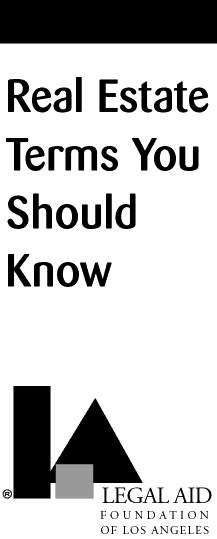Real Estate Terms You Should Know
A fact sheet that lists real estate terms that are helpful to know if you own or are thinking of buying you own home.

GRANT DEED - a document which transfers ownership of real property from one owner to another. All or only a portion (for example, 1/2 or 3/4) of an ownership interest can be transferred. By using a grant deed, the person transferring an interest in real property is representing that the interest transferred is genuine and free from undisclosed claims and defects.
QUITCLAIM DEED - a document which transfers all or part of an interest in real property to another. When a quitclaim deed is used, the person to whom the interest is transferred accepts all risk of undisclosed claims and defects.
DEED OF TRUST (Trust Deed) - a document which creates a security interest in real property, usually used as collateral for a debt or loan. If the borrower fails to repay the debt as promised, the Deed of Trust can be foreclosed on to repay the debt.
NOTE - a written promise or contract to repay a debt or loan. The note usually states the amount and frequency of payments. Payment on the note is often secured by a Deed of Trust or Mortgage.
FORECLOSURE - the process by which a promise to repay a loan or debt secured by a deed of trust is enforced against real property. At the conclusion of foreclosure proceedings, the real property is sold to repay the debt or loan at a public auction called a foreclosure or trustee's sale.
NOTICE OF DEFAULT - a document which gives formal notice that a borrower has defaulted on a loan or debt. A Notice of Default is the first step in the foreclosure process and notifies the borrower that the property can be sold unless the default is cured. A Notice of Default is recorded with the County Recorder and published for circulation to the general public.
NOTICE OF SALE - a document which gives the date, time and place a property in foreclosure will be sold at public auction. A Notice of Sale is recorded with the County Recorder and published for circulation to the general public. The borrower has until 5 days before the sale to pay the amount in default. After that, the lender can demand payment of the entire debt.
DECLARATION OF HOMESTEAD - a document which, when recorded with the County Recorder, protects a portion of the property owner's equity (market value minus secured debt) in the property from creditors who have obtained a judgment against the property owner. A Declaration of Homestead DOES NOT provide protection from foreclosure.
POWER OF ATTORNEY - a document by which one person gives another the legal right to take certain action(s) on his or her behalf (such as to sign documents, take out a loan, sell property, take money out of a bank account). A Power of Attorney can be used to give another person the right to do for you just about anything you can do for yourself.
BAIL BOND LIEN - A lien against real property to secure appearance and payment under a bail bond. Bail bonds are usually secured by a Deed of Trust, which enables the bail bond company to foreclose on real property if the person out on bail does not show up for court or the bond premium is not paid.
RECONVEYANCE - a document which returns an interest in real property back to the person who transferred it in a Deed of Trust. The Reconveyance is recorded in the County Recorder's office as the official record that a loan or debt secured by a Deed of Trust has been paid. A Reconveyance must be provided once the debt or loan has been repaid.
BALLOON PAYMENT LOAN (also called Interest Only Loan) - a type of loan transaction in which the borrower makes usually smaller payments of interest only on the amount borrowed for some period of time, after which the full amount borrowed must be paid in full in one payment. If the borrower cannot make the payment, the property can be placed in foreclosure. This type of loan cannot be included in a chapter 13 bankruptcy.
© Copyright 1995 Legal Aid Foundation of Los Angeles
Produced by Consumer Action
Electronic publication funded by BACEF
Published / Reviewed Date
Published: April 01, 1995
Download PDF
No Download Available
Sponsors
Bank of America Consumer Education Fund (BACEF)
Filed Under
Foreclosure ♦ Housing ♦ Buying A Home ♦ Mortgages ♦
Copyright
© 1995 –2024 Consumer Action. Rights Reserved.



